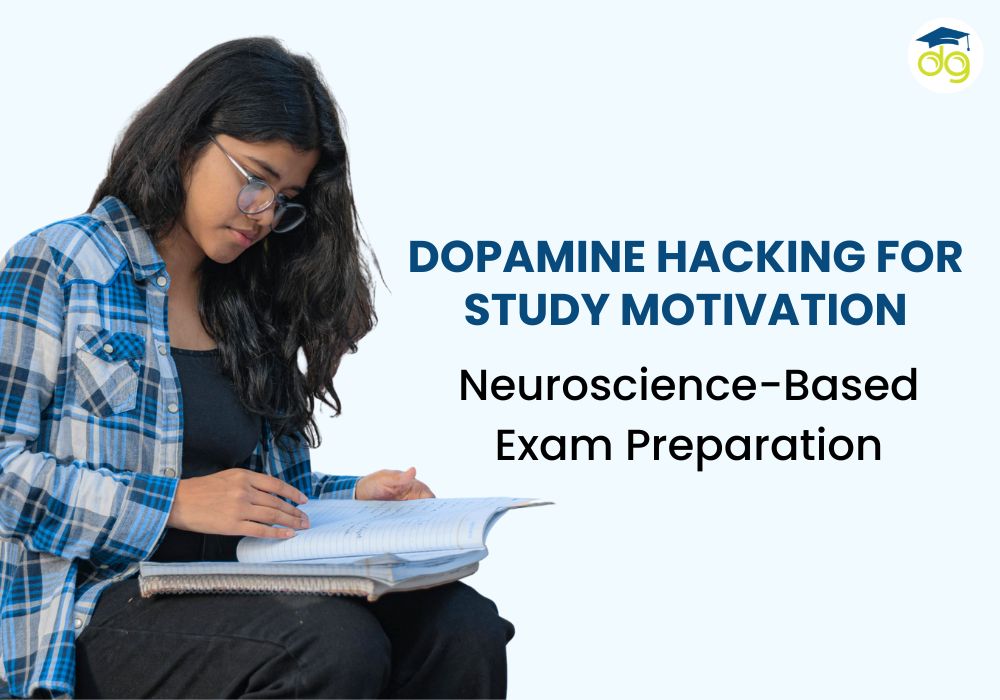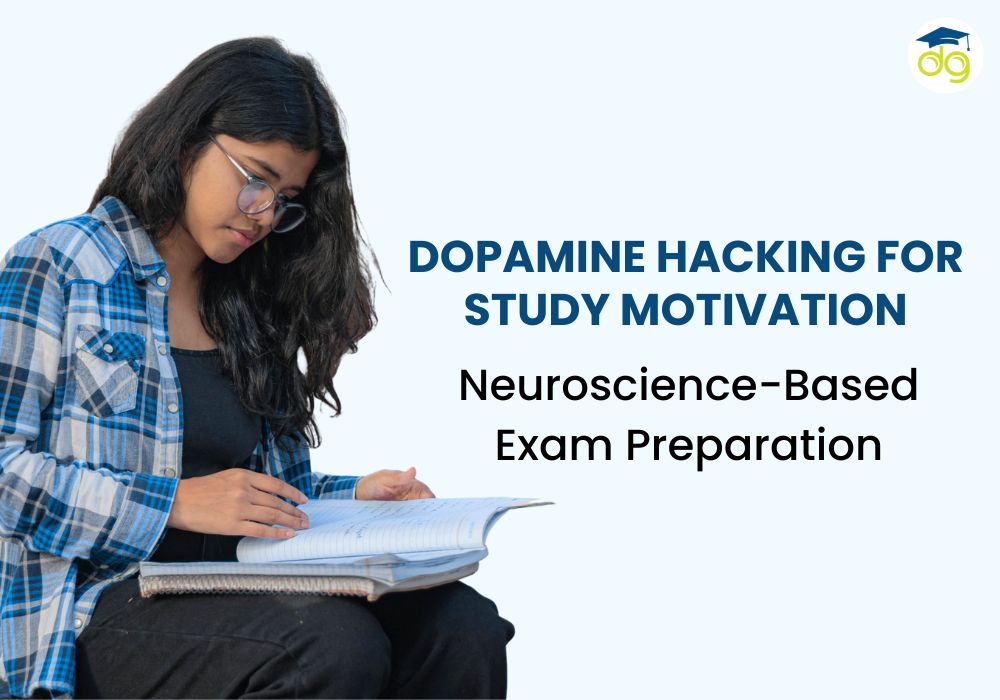Dopamine Hacking for Study Motivation: Neuroscience-Based Exam Prep
Boost Focus and Motivation with Brain-Science Study Techniques
Everyone has experienced the moment of low motivation in the days leading up to a crucial test. Notes are prepared. The syllabus is in place; however, the motivation for studying seems to fade away. This isn't a sign of laziness; it's biology.
The underlying mechanism of motivation is dopamine, a chemical messenger that affects brain function, focus, and reward-driven behaviour. Neuroscience shows that, by understanding the ways to increase dopamine, students will be able to improve their ability to concentrate, improve their satisfaction with studying, and better prepare for their exams.
Learning about the research of dopamine and how to manage it will transform test preparation into a satisfying and enjoyable learning experience.
1. Understanding Dopamine: The Brain's Motivation Molecule
Dopamine is frequently referred to as"the feel-good" neurotransmitter, but actually, it's more of a motivation molecule. It controls cognitive function, memory, and the processing of reward. Dopamine levels increase, and the brain is stimulated; it feels compelled to finish tasks and achieve objectives, such as finishing the study book or working on the most difficult problem.
In simple terms, Dopamine informs the brain that "That felt good -- do it again."
Parts of the Brain and Their Functions in Dopamine Regulation
Different brain regions play vital parts in the management of dopamine
- Prefrontal Cortex - Controls focus, decision making, and planning.
- Limbic System - Processing emotions as well as rewards.
- Basal Ganglia - helps with the formation of habits and consistent performance.
When dopamine levels are at a balanced level, the brain and body work together, enhancing emotional well-being and concentration in study sessions.
2. How Dopamine Affects Motivation During Study
Dopamine produces a strong reward-feedback loop, which fuels the need to learn and achieve. If a student is successful in completing an assignment, dopamine gets released to signal achievement. The brain is then compelled to do the same thing again.
In reality, excessive instant reward options -- such as browsing through social media or playing games -- can trigger brief dopamine surges. As time passes, these surges diminish sensitivity, which makes it difficult to be inspired with long-term goals such as exams.
Neuroscience research suggests that constant tiny achievements can maintain dopamine levels steady and lasting, improve cognitive function and emotional stability during test preparation.
3. Natural Ways to Increase Dopamine for Better Study Focus
Contrary to what many believe, there is no need for supplements in order to boost dopamine levels. A few simple habits in your daily routine could increase dopamine naturally and enhance mental well-being.
a. Set Clear Study Goals
The process of breaking down large goals into small milestones can often provide a rewarding experience. The completion of a chapter or completing 10 problems gives you the release of dopamine, which helps increase focus.
b. Use Positive Reinforcement
The reward one receives after completing the study time (a quick walk, snack, or a song of your choice) will reinforce positive reinforcement loops.
c. Sleep and Rest
Dopamine receptors are activated when you sleep. are reset. An exhausted brain cannot effectively release dopamine, which makes sleep essential to keep you motivated.
d. Manage Study Environment
An uncluttered desk, excellent lighting, and calm background music can improve brain function and comfort in emotional states, for dopamine to flow freely.
4. Physical Exercise: The Natural Dopamine Booster
Physical exercise is among the most efficient and fastest methods to boost dopamine. The exercise increases blood flow to brain cells, increases neurotransmitter production, and improves overall cognitive function.
Things like vigorous walking and stretching exercises, yoga, or dancing lightly can improve emotional well-being and improve your mental focus prior to taking classes.
Just a short workout session could cause serotonin release and dopamine, which makes the brain aware and open to new knowledge.
5. Nutrition and Dopamine: Eat for Focus and Energy
The food we eat directly affects the production of neurotransmitters. Certain brain-healthy foods contain substances that help dopamine synthesis.
Foods That Increase Brain Power and Dopamine Levels
Food Type | Examples | How It Helps |
| Protein-rich foods | Chicken, eggs, fish, and tofu | It is a constituent of tyrosine, which is a precursor of dopamine. |
| Omega-3 sources | Walnuts, salmon, flaxseeds | Help maintain the health of brain cells and Neurotransmission |
| Antioxidant-rich foods | Green, Berries, Spinach, tea | Protect dopamine-producing neurons |
| Magnesium-rich snacks | Almonds, bananas, avocado | Dopamine receptors are controlled and can reduce stress |
Consuming these foods can help boost dopamine naturally, which improves brain function in the course of exam preparation. Students who concentrate on diet often report sharper concentration, faster recall, and a better balance of mood.
6. Relaxation and Mindfulness: Keeping Dopamine Balanced
Insufficiency in stimulation -- whether from coffee, phones, or constant pressure on the study could trigger dopamine burning out. It's not enough to boost dopamine levels, however, to balance it.
Engaging in relaxation exercises like meditation, breathing techniques, or guided meditation restores your equilibrium and stops the overproduction of dopamine.
A few minutes of deep breaths or meditation during study time can help reduce anxiety, enhance mental well-being, and help you regain concentration.
7. Brain-Boosting Habits Before an Exam
When it comes to the days before the exam, students should practice neuroscientific-based habits to improve dopamine production and cognitive function.
Top Brain-Boosting Habits
- Sleeps for up to 7-8 hours: Let dopamine receptors regenerate.
- Early morning sunlight exposure: Regulates the circadian rhythm and enhances dopamine.
- Light Motion: Walk or stretch before you study to help focus your attention.
- Eat balanced meals: Mix the protein, complex carbs, and healthy fats.
- Visualization or Gratitude Practice: Builds emotional stability and trust.
These methods not only boost academic achievement but also improve general emotional well-being and mental resilience.
8. Quick Reference: Dopamine-Boosting Study Routine
Habit | Benefit | Scientific Insight |
| Morning Exercise | Dopamine release from Triggers | Enhances alertness and mood |
| Protein Breakfast | Fuels neurotransmitters | Tyrosine supports dopamine synthesis |
| Study Milestones | Reinforces the motivation loop | Activates reward circuits |
| Relaxation Breaks | Reduces dopamine fatigue | Regulates the hormones that cause stress. |
| Consistent Sleep | Restores receptor sensitivity | Enhances memory and improves learning |
The small and consistent steps aid students in maintaining their focus through the entire exam preparation stage.
9. Common Habits That Drain Dopamine
Many students do not realize they are engaging in actions that reduce dopamine levels and cause harm to cognitive function. Understanding these patterns could help keep motivation from slipping away.
Habits That Deplete Dopamine
- Utilizing social media to its fullest extent: Creates artificial dopamine increases and reduces the receptors.
- Skipping sleep: It blocks the natural process of restoring dopamine.
- Foods that are junk: They lack the nutrients that are essential to the balance of neurotransmitters.
- Multitasking: It reduces dopamine and focus effectiveness.
- Negative thoughts: Lower mood and decreased dopamine release.
If they can change their habits, Learners can safeguard their emotional well-being and their brain's efficiency.
10. Sustainable Dopamine Management: Neuroscience Insights
Dopamine is a neurochemical that works best when it's earned, not excessively stimulated. Dopamine management that is sustainable requires routines that reward the brain slowly, thereby developing resilience, not dependence.
Practical Tips for Long-Term Dopamine Balance
- Habit stacking: Combine a successful routine (studying) and a smaller reward (tea or a walk).
- Delayed Gradification: Make sure to save entertainment until after studies are finished.
- Reasonable Breaks: Rest with intention instead of scrolling endlessly.
- Journaling: Tracking progress reinforces reward pathways.
Dopamine balance helps students maintain emotional well-being and manage anxiety during exams, and keeps them motivated through their educational journey.
Neuroscience-Based Study Routine: A Sample Schedule
Time | Activity | Dopamine Effect |
| 6:30 AM | Morning sunshine and gentle stretching | Natural dopamine activation |
| 7:00 AM | Protein breakfast (eggs, nuts, fruits) | Neurotransmitter production is fuelled by neurotransmitters. |
| 8:00-10:00 AM | Block of deep focus for study | Cognitive function at its peak |
| 10:15 AM | A relaxing break or even meditation | Resets dopamine levels |
| 1:00 PM | Lunch with a balanced menu | Stabilizes blood sugar & brain function |
| 3:00 PM | Exercise or walk | Naturally recharges dopamine |
| 6:00 PM | Review of notes from the study in light of | Retention of memory is strengthened |
| 10:00 PM | Sleep | Dopamine resets and helps restore focus. |
This practice helps maintain healthy dopamine levels while promoting good study habits.
Emotional Well-Being: The Missing Link in Study Motivation
When dopamine fuels the desire to do something, emotional well-being will ensure that the motive is a meaningful one. Students who practice self-compassion and gratitude and a sense that they are on the right track, are more motivated and have less exhaustion.
The neuroscience research shows that when students are motivated by positive emotions in the goals they are pursuing, dopamine signals increase, making studying sessions more enjoyable and less anxiety-inducing.
The need to encourage emotional self-care is equally important as managing time or a test method.
Conclusion
Motivation doesn't just revolve around discipline. It's about biology, chemistry, and the mind working in tandem. If you can learn to increase dopamine by consuming food, physical exercise, relaxation, and purposeful studies, students are able to turn exam preparation into an enjoyable and sustainable procedure.
Learning how the brain works can give students a significant advantage: they study more efficiently and not as hard. By balancing their habits and making mindful selections, success becomes more than only achievable, but also fun.
The goal of Skoodosbridge the mission is to connect learning with neuroscience and career growth. Teachers and students can examine how understanding the brain function, cognitive development, and mental well-being leads to better study habits and better career preparation.
Find workshops, materials, and mentorship programs to assist learners in applying science-backed strategies, including dopamine control and emotional resilience, in the real world of learning.
Bring your mind and your future, Skoodosbridge.
FAQs
1. How can I naturally increase dopamine for better study focus?
By exercising regularly and getting quality sleep, and smaller rewards for studying, and a healthy surroundings that promotes concentration.
2. What foods help boost dopamine levels for exam preparation?
Foods rich in tyrosine, like eggs and fish, nuts, and antioxidant-rich fruits, such as berries, can boost dopamine levels.
3. Does physical exercise improve dopamine and brain performance?
Yes. Exercise increases dopamine levels and improves alertness, memory, and emotional balance.
4. How does dopamine affect motivation during study?
It triggers the reward system of the brain, which transforms goals in study into satisfying accomplishments.
5. What are the best brain-boosting habits before an exam?
Get enough sleep, eat balanced meals, exercise regularly, and incorporate exercises for relaxation or visualisation to maintain constant energy.
Categories
Archives
Similar Posts

Dopamine Hacking for Study Motivation: Neuroscience-Based Exam Prep
by Skoodos Bridge

Electric Vehicle Jobs: Top Mechanical Engineering Careers in EV Sector
by Skoodos Bridge

EdTech Careers After Engineering: Build Learning Apps & Startups
by Skoodos Bridge

Gaming Meets Medicine: VR Therapy Careers for NEET Aspirants
by Skoodos Bridge

WhatsApp Group Study: Boost Your Competitive Exam Preparation
by Skoodos Bridge

Drone Engineering Careers: Aerospace Pathways, Exams & Job Opportunities
by Skoodos Bridge

Instagram vs LinkedIn: Smart Social Media Strategy for UPSC Aspirants
by Skoodos Bridge

YouTube Shorts for Revision: Micro-Learning to Memorize Formulas Quickly
by Skoodos Bridge

ChatGPT for JEE Physics: Smart Prompts to Master Problem Solving
by Skoodos Bridge


Leave a Comment